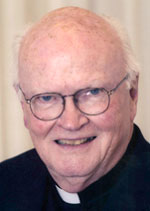About 400 years ago, the Welsh-born English poet George Herbert expressed the encouraging idea that anyone who walks in hope “dances without music.”
Most of us have to make it through life without the benefit of background music. Whether you walk or dance, you make your way each day by even-paced measures without the tempo-enhancing encouragement of violins and trumpets.
For many years, the movies have been offering lessons about life that are cleverly (and often deceptively) wrapped in background music. Characters in the films have music to intensify their emotional highs, warn them (and the audience) of impending danger or accelerate their slide into deeper despair.
In those rare moments of emotional intensity when the music stops, the viewer is left in a suspended state of watching and waiting, trying (often uncomfortably) to figure out what will happen next.
Real life is different. You can make your own movies, so to speak, by imagining what, and why, and how you will do what you are going to do today and in all your tomorrows. But you have to choose the attitude — the inner silent state of mind — that will accompany you (and serve as your “accompaniment”) along the way. If you want to walk in hope, you have to choose to do so.
Hope is not to be confused with optimism, which focuses always on “the best.” “Optimizing” opportunities and achieving “optimal” outcomes might be “optimistically” regarded as part of “the best” in the “best of all worlds.”
[hotblock]
That is not the way it is with hope. Hope is a great deal closer to the human heart — hesitant or stout, weak or strong — and to the ground on which the have-a-heart person walks (or dances).
I have no idea when the word “hopefully” rose to the prominent place of misapplication that it now enjoys in the American vernacular. That adverb means “in a happily expectant way.” If used correctly, it would describe a personal condition similar to the mood conveyed in expressions like “proudly announce,” or “gladly welcome.” The misapplied “hopefully” (e.g., “Hopefully, we will hear from them soon”) really means, in this case, “It is to be hoped that we will hear from them soon.”
This is more than a simple grammatical quibble. Most of the people I hear punctuating their conversations with the word “hopefully” do not give all that much evidence of being all that hopeful.
Hope is the pillar of the world. It is a theological virtue and its object is always God. Because of it, the person of hope is a lot stronger than he or she might think. The novelist John Updike once wrote that God “is a bottomless encouragement to our faltering and frightened being.”
As the famous prayer goes, “Lord, make me an instrument of your peace; … where there is despair, let me sow hope.”
So be hopeful; just decide to let it happen.
***
Jesuit Father William J. Byron is university professor of business and society at St. Joseph’s University, Philadelphia. Email: wbyron@sju.edu.
PREVIOUS: How to fit pre-Cana prep in a long-distance romance
NEXT: Pope: Better to eat humble pie than let anger harden the heart



Share this story